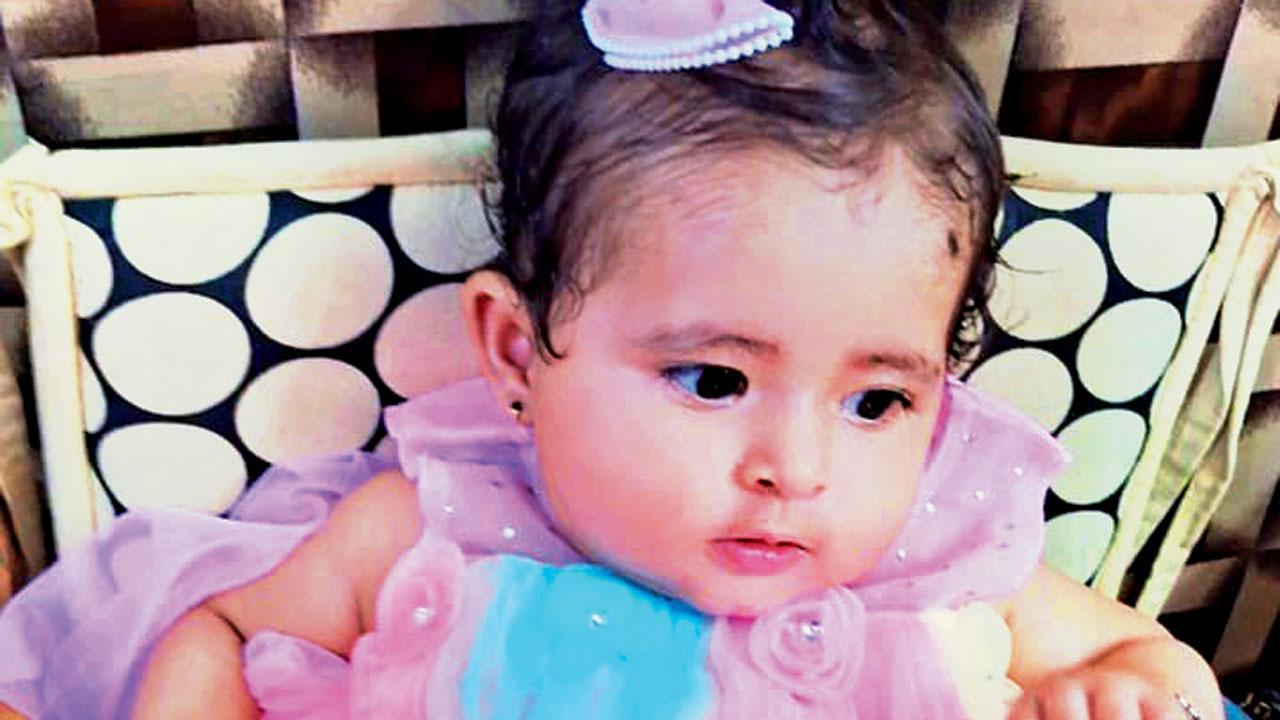While an anonymous donor sent Rs 2 lakh, the Chief Minister’s Office sent Rs 50,000 for baby Aakriti who is suffering from Type 1 of Spinal Muscular Atrophy; still, parents are far from target fund of Rs 34 lakh

Aakriti has made significant progress after her diagnosis and subsequent treatment over the past six months
Last week, a Good Samaritan donated Rs 2 lakh to KEM hospital for the lifesaving treatment of 14-month-old Aakriti who is suffering from Spinal Muscular Atrophy (SMA), after reading about her condition in mid-day. Additional financial aid came from the Chief Minister’s Office (CMO), which released Rs 50,000 for her treatment.
ADVERTISEMENT
With hardly a week left for Aakriti’s next lifesaving dosage, her parents have once again written to the chief minister (CM) and deputy chief minister, seeking financial aid. mid-day had reported on January 4 about Aakriti’s parents’ struggle to arrange the drug Risdiplam which costs over R6 lakh per dose and is to be administered every 37 days.
A Good Samaritan from Mumbai contacted Aakriti’s parents through KEM hospital. “He sought additional information about Aakriti and also desired to go through her medical reports, which were sent to him. Last week, we were informed by KEM hospital that a donation of Rs 2 lakh was received for Aakriti’s treatment. The hospital also informed us that an additional Rs 50,000 was received from the CM’s fund. We also received an email about it from the CMO,” said Aakriti’s mother, Chartered Accountant Kirti Singh, a resident of CBD Belapur, Navi Mumbai. Kirti gave up her corporate job after Aakriti was diagnosed with SMA type 1 (SMA1) at the age of four months.
“The financial aid has been a major support in saving Aakriti’s life. The funds collected so far have totalled Rs 5 lakh yet it is too little as annual treatment would cost up to R34 lakh and half-yearly treatment would cost Rs 12 lakh,” Kirti said. The effects of Aakriti’s last dosage will start waning in a week. “We have written again to CM Eknath Shinde, Deputy CMs Devendra Fadnavis and Ajit Pawar, Tanaji Sawant, minister of public health and family welfare, and Milind Mhaiskar, additional secretary (health) on January 15 seeking help for Aakriti’s treatment. We have not received any reply so far,” Kirti said.
How treatment helped
Aakriti received the last dose on December 27, 2023. “Without further dosage, Aakriti’s condition will deteriorate and her life will be at risk,” Kirti said. Aakriti has been receiving medicines under a sampling program through KEM Hospital for the last six months and her development is significant. Her CHOP INTEND score (Children’s Hospital of Philadelphia Infant Test of Neuromuscular Disorders) has gone from 17 to 44.
It quantifies the natural decline of motor skills in SMA1 infants. The maximum possible score is 64. By six months of age, SMA1 infants almost never achieve a CHOP INTEND score greater than or equal to 40. Aakriti can now roll on her own and sits independently with no respiratory or swallowing disorder. “We are grateful for people who have helped us in difficult times. We are waiting for the government to help us save our child,” Kirti said.
Increased grant
Alpana Sharma, founder of Cure SMA Foundation, whose son is also being treated for SMA2, said, “We have over 1,300 registered SMA patients with CureSMA India. As per our database, there are 28 per cent SMA1, 49 per cent SMA2, 20 per cent SMA3, and 3 per cent SMA4 patients in India. This means that around 28 per cent of patients may die even before diagnosis as SMA1 is the most severe. The remaining 72 per cent of patients struggle with progressive disease leading to severe and multiple disabilities. The government has hiked the grant for rare disease treatment from R20 lakh to R50 lakh as per a new office memorandum issued on May 19, 2022, by the Union Ministry of Health & Family Welfare Rare Diseases Cell, New Delhi.”
Policy on paper
“The new rule will allow any rare disease patient to claim Rs 50 lakh from the government. The grant was hiked by amending Paragraph 10(i) of the National Policy for Rare Diseases (NPRD), 2021, which provided ‘financial support up to Rs 20 lakh under the Umbrella Scheme of Rashtriya Arogya Nidhi (RAN)’. In its place, the revised policy replaced the above rule with the following: ‘Financial support up to R50 lakh shall be provided to the patients suffering from any category of the Rare Diseases’. Sadly, not a single SMA patient has received the grant. For us, this policy remains on paper. All our pleas to the government are falling on deaf ears,” Sharma said.
“As per data published by the Department of Genetics, SGPGIMS Lucknow and the Department of Genetics, Sir Ganga Ram Hospital, the carrier frequency of SMA in India is 1 in every 38 people. The incidence rate of SMA is 1 in every 5,670 to 3,112 live births (average 4,391 births). This means that for the current live births of 15,956,914, there are around 3,634 children born with SMA every day and 13,26,410 children are born with SMA every year,” Sharma added. “We are grateful to mid-day for their exceptional support in spreading awareness about this gruesome disease and our struggle. We are truly grateful to the Good Samaritan who anonymously donated Rs 2 lakh. It’s my humble request to all readers to help save Aakriti,” Sharma said.
Dec 27
Day Aakriti was given the last dose
37
Days interval at which Aakriti needs the meds
 Subscribe today by clicking the link and stay updated with the latest news!" Click here!
Subscribe today by clicking the link and stay updated with the latest news!" Click here!







